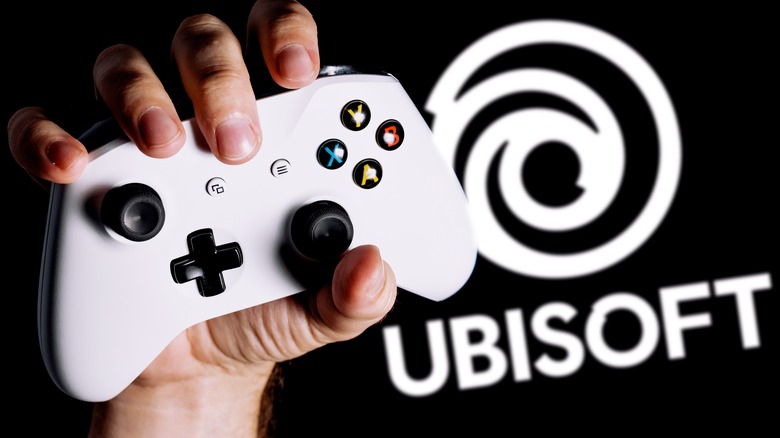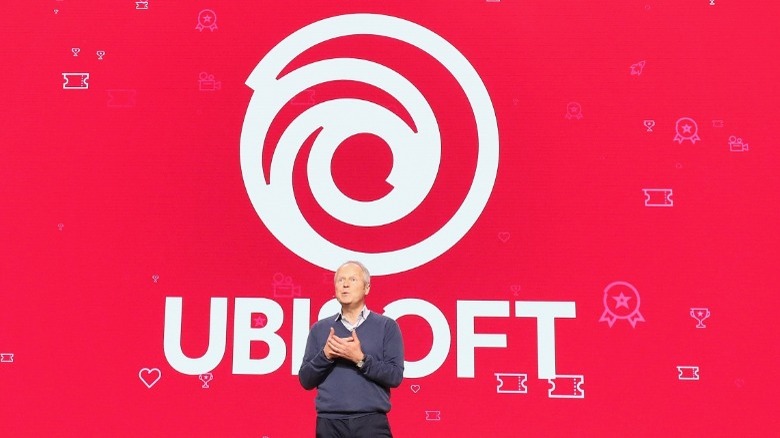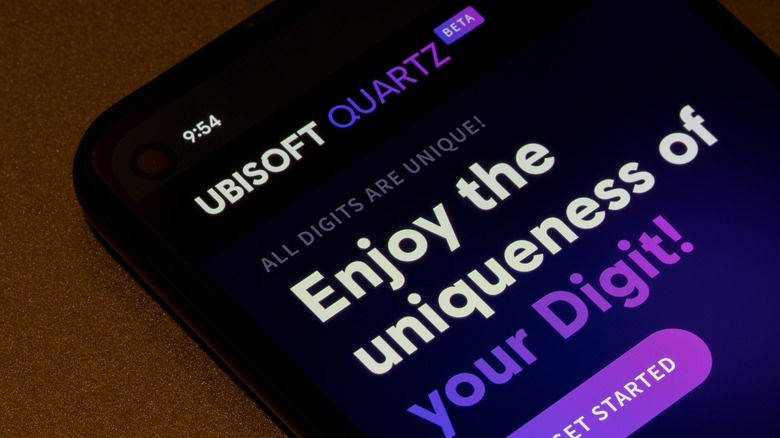This Is Why So Many People Hate Ubisoft
Gaming is a popular hobby that's had a positive impact on many people around the globe, but its most pervasive problems stem from the divisive nature of the industry. Sometimes it's fun to joke with your fellow gamers, whether for their platform of choice or the titles they choose to fill their library, but sometimes there's an unnecessary amount of hate and vitriol that gets thrown around — especially online. Other times, it's developers and publishers that receive the criticisms, and sometimes this is justified.
According to a survey by Rave Reviews, which scraped Twitter for negative posts weighed at various brands worldwide, Ubisoft is the most derided gaming brand around by a significant margin. Even though the creators of the survey admit that this research isn't a perfect representation of the truth, Ubisoft's bad habits and poor execution make it easy to see why people may harbor negative feelings toward the brand. Over the years, Ubisoft has taken control of many beloved franchises and made some questionable decisions — that's without even mentioning the scandals the brand has been involved with.
Ubisoft's reckoning
Starting in 2020, Ubisoft has been undergoing something of a reckoning as a result of workplace misconduct allegations. According to reporting by Kotaku in 2020, workers at Ubisoft's France and Canada offices spoke out against sexual misconduct allegedly perpetrated by members of upper management. In the allegations against one of Ubisoft Toronto's co-founders, Maxime Béland, a female employee claimed that he had choked her at a work party.
That allegation was just the start of a movement against what Ubisoft workers referred to as a toxic culture. According to a former Ubisoft Toronto employee who spoke to Kotaku, the HR and management at the company "disregards complaints [and] enables this behavior from men," undervalues contributions made by women, and normalizes sexism in the workplace. Several Ubisoft executives have since stepped down as a result of investigations into toxic management practices, sexual harassment allegations, or workplace misconduct — including Michel Ancel, Maxime Béland, Tommy François, Serge Hascoët, Ashraf Ismail, and Yannis Mallat.
In October 2020, CEO Yves Guillemot published the results of a survey conducted at Ubisoft by a third-party research firm shortly after the initial accusations, according to The Verge. The survey was anonymous, and included some 14,000 employees, with the results showing that 25% of Ubisoft employees had experienced or witnessed some form of workplace misconduct, while 20% reported that they didn't feel fully respected or safe in the workplace. Reports of harassment were also found to be more common among women and non-binary employees.
Predatory monetization adds to a tarnished reputation
To add to Ubisoft's public reputation, many Ubisoft franchises like "Far Cry," the "Tom Clancy's" games, "Assassin's Creed," "Watch Dogs," and "For Honor" have historically been wildly successful, but have seen a decline in popularity in more recent installments. "Assassin's Creed Valhalla," for one, was criticized by reviewers like Skill Up for being too long, while "Far Cry 5" received largely positive reviews, but many comments online expressed disappointment toward the formulaic open-world game design that didn't bring too much innovation to the table (via Reddit).
The addition of microtransactions to full-price games, like the "Time Savers" in "Assassin's Creed Odyssey" — and more recently, the company moving to add NFTs into its games — has also earned the ire of many gamers. While microtransactions in gaming are nothing new, gamers were upset by more recent examples because it seemed like the game was at least partially designed around being able to sell microtransactions, making them more intrusive than usual (via PC Gamer).
There was also the blowback from gamers on Ubisoft's attempt at monetizing in-game items via NFTs. Ubisoft Quartz was an NFT program that made its first appearance in "Tom Clancy's Ghost Recon Breakpoint," and would turn in-game cosmetics into collectible NFTs. According to Kotaku, Quartz wasn't only despised for being a blatant cash grab, but also because it was a bad implementation of an NFT in general — with an oversupply of tokens and weak security.
Add to these issues Ubisoft's reputation for closing down servers for games that are as little as three years old (as reported by GamesRadar), and you have a perfect recipe for upset gamers.


